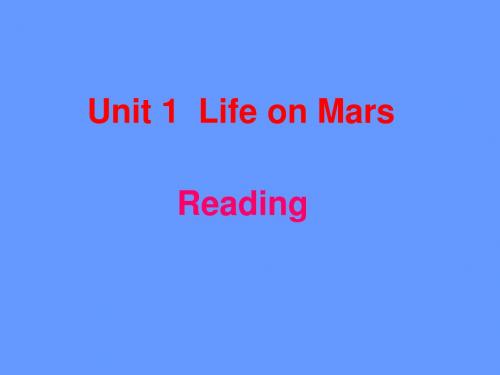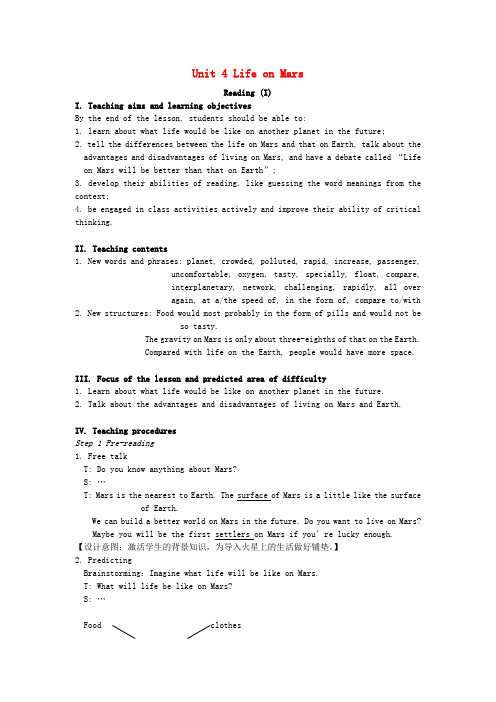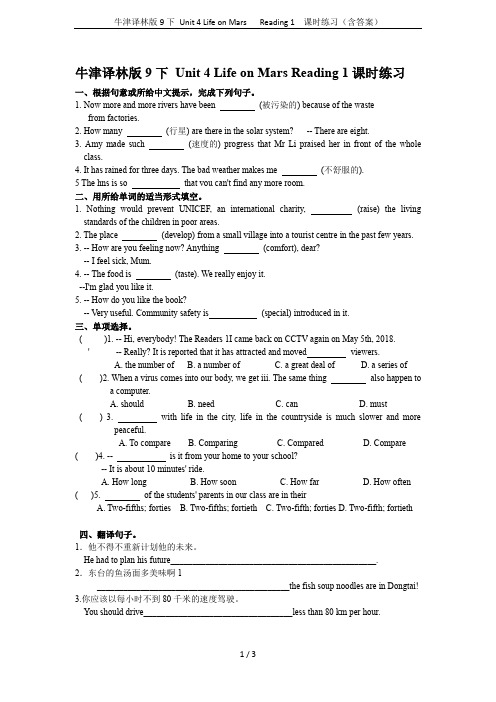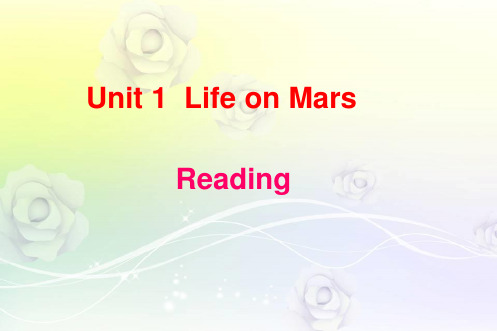牛津译林版英语九年级下册《Life on Mars》Reading
牛津译林版英语九下Unit4《LifeonMars》(Vocabulary)说课稿

牛津译林版英语九下Unit 4《Life on Mars》(Vocabulary)说课稿一. 教材分析《Life on Mars》是人教版牛津译林英语九年级下册第四单元Vocabulary部分的一篇文章。
文章主要讨论了人类对火星的探索以及火星上可能存在的生命迹象。
本节课的主要内容是让学生掌握与火星探索相关的词汇和表达方式,提高学生的阅读理解能力和词汇运用能力。
二. 学情分析九年级的学生已经具备了一定的英语基础,对于一些基本的词汇和语法知识有了初步的了解。
但是,由于火星探索是一个相对较新的领域,学生可能对此了解不多,需要通过本节课的学习来丰富他们的知识储备。
此外,学生对于英语阅读的理解能力参差不齐,需要在教学过程中给予不同的学生不同的关注和指导。
三. 说教学目标1.知识目标:让学生掌握与火星探索相关的词汇和表达方式,如“rocky”, “atmosphere”, “landscape”, “speculate”, “evidence”等。
2.能力目标:提高学生的阅读理解能力和词汇运用能力,使学生能够熟练运用所学词汇和表达方式进行口语表达和写作。
3.情感目标:激发学生对科学探索的兴趣,培养学生的创新思维和科学精神。
四. 说教学重难点1.重点:让学生掌握与火星探索相关的词汇和表达方式。
2.难点:理解文章中的一些科学概念和观点,如火星的大气层、地形地貌等,并能够运用所学知识进行口语表达和写作。
五. 说教学方法与手段1.教学方法:采用任务驱动法,让学生在完成具体任务的过程中学习和运用词汇。
2.教学手段:利用多媒体课件和网络资源,为学生提供丰富的学习材料和信息。
六. 说教学过程1.Pre-reading:让学生观看关于火星的短视频,激发学生对火星探索的兴趣,并引导学生思考火星上是否存在生命的可能性。
2.While-reading:学生自主阅读文章,回答相关问题,教师引导学生关注文章中的关键词汇和表达方式,并进行讲解和解释。
【牛津译林版】2015九年级英语下册Unit1LifeonMars_Reading_精品课件

3. Humans have to wear special boots to make themselves heavier. 4. The boots will probably become fashionable .There’ll be many different d esigns for s ettlers to choose from.
3 What do humans need to survive?
Food, water and air
4 What will scientists do They will develop plants that can grow on Mars
5 Is gravity on Mars a big problem? Why?
Where will we live on Mars?
In a dome with 10 bedrooms
Life on Mars will be b etter than that on Earth in many ways. 1. people have more space . 2. Living in a dome with 10 bedrooms is highly possible .
Some important phrases: at the moment
at present more and more crowded
first of all
large numbers of
a very short time
at the speed of
three-eighths of that
Zk
1. Scientists should develop plants that can grow on Mars.
牛津译林版九年级下册英语《Unit 4 Life on Mars Reading 1 Life》课件公开课 (2)

Read Paragraph2-6 and fill in the blanks
at present:very slow, takes months
Journey to Mars by 2100: at the _sp_ee_d_of_lig_ht,
Moving
About _20_ minutes
Disadvantages of life on Mars • Low gravity , dangerous • Food ,not, fresh as , on Earth. • Travel , feel sick. • cold , go outside • Far away ,friends , Earth • Food ,not taste good
teachers
Have a debate(辩论 ) Do you like living on Mars?
Team 1: Like the life on Mars
Advantages of life on Mars
Team 2: Dislike the life on Mars
Disadvantages of life on Mars
• The Earth is becoming more and more(_c拥ro_w挤d_的ed.)
The air is p_ol_lut_ed so seriously.
It is hoped that people could build a better world on another planet
We can build a better world on Mars.
1.How many paragraphs are there in the article?
牛津译林版九年级下册Unit 4《Life on Mars》word教案4

Unit 4 Life on MarsReading (I)I. Teaching aims and learning objectivesBy the end of the lesson, students should be able to:1. learn about what life would be like on another planet in the future;2. tell the differences between the life on Mars and that on Earth, talk about the advantages and disadvantages of living on Mars, and have a debate called “Life on Mars will be better than that on Earth”;3. develop their abilities of reading, like guessing the word meanings from the context;4. be engaged in class activities actively and improve their ability of critical thinking.II. Teaching contents1. New words and phrases: planet, crowded, polluted, rapid, increase, passenger,uncomfortable, oxygen, tasty, specially, float, compare,interplanetary, network, challenging, rapidly, all overagain, at a/the speed of, in the form of, compare to/with 2. New structures: Food would most probably in the form of pills and would not beso tasty.The gravity on Mars is only about three-eighths of that on the Earth.Compared with life on the Earth, people would have more space.III. Focus of the lesson and predicted area of difficulty1. Learn about what life would be like on another planet in the future.2. Talk about the advantages and disadvantages of living on Mars and Earth.IV. Teaching proceduresStep 1 Pre-reading1. Free talkT: Do you know anything about Mars?S: …T: Mars is the nearest to Earth. The surface of Mars is a little like the surface of Earth.We can build a better world on Mars in the future. Do you want to live on Mars?Maybe you will be the first settlers on Mars if you’re lucky enough.【设计意图:激活学生的背景知识,为导入火星上的生活做好铺垫。
牛津译林版9下 Unit 4 Life on Mars Reading 1 课时练习(含答案)

牛津译林版9下Unit 4 Life on Mars Reading 1课时练习一、根据句意或所给中文提示,完成下列句子。
1. Now more and more rivers have been (被污染的) because of the wastefrom factories.2. How many (行星) are there in the solar system? -- There are eight.3. Amy made such (速度的) progress that Mr Li praised her in front of the whole class.4. It has rained for three days. The bad weather makes me (不舒服的).5 The hns is so that vou can't find any more room.二、用所给单词的适当形式填空。
1. Nothing would prevent UNICEF, an international charity, (raise) the living standards of the children in poor areas.2. The place (develop) from a small village into a tourist centre in the past few years.3. -- How are you feeling now? Anything (comfort), dear?-- I feel sick, Mum.4. -- The food is (taste). We really enjoy it.--I'm glad you like it.5. -- How do you like the book?-- Very useful. Community safety is (special) introduced in it.三、单项选择。
牛津译林版九年级下册Unit4《LifeonMars》说课稿2

牛津译林版九年级下册Unit 4《Life on Mars》说课稿2一. 教材分析《Life on Mars》是人教版牛津译林英语九年级下册的一篇阅读文章,主要介绍了科学家对火星上是否存在生命的探索和研究。
文章内容丰富,语言优美,难度适中,能够激发学生对科学的兴趣和探究欲望。
通过本篇文章的学习,学生可以进一步了解火星的相关知识,提高阅读理解能力,同时培养合作和探究的精神。
二. 学情分析九年级的学生已经具备了一定的英语基础,对阅读理解也有一定的掌握。
但是,由于文章涉及到一些科学知识,学生可能对部分内容感到陌生。
因此,在教学过程中,教师需要关注学生的个体差异,充分调动学生的积极性,引导他们通过阅读和讨论来掌握文章内容。
三. 说教学目标1.知识目标:学生能够掌握文章中涉及的主要词汇和短语,理解文章大意,了解火星的相关知识。
2.能力目标:学生能够运用所学词汇和短语进行口头和书面表达,提高阅读理解能力和合作探究能力。
3.情感目标:培养学生对科学的热爱和好奇心,增强环保意识。
四. 说教学重难点1.教学重点:学生能够掌握文章中涉及的主要词汇和短语,理解文章大意,了解火星的相关知识。
2.教学难点:学生能够运用所学词汇和短语进行口头和书面表达,提高阅读理解能力和合作探究能力。
五. 说教学方法与手段在本节课中,我将采用任务型教学法、合作学习法和探究学习法。
通过设计各种任务和活动,引导学生积极参与,提高他们的阅读理解能力和合作探究能力。
同时,利用多媒体教学手段,为学生提供丰富的教学资源,增强课堂趣味性。
六. 说教学过程1.Pre-reading:引导学生关注火星,激发学生对文章的兴趣。
2.While-reading:学生自主阅读文章,完成相关任务,教师给予指导。
3.Post-reading:学生进行讨论和表达,教师进行评价和反馈。
七. 说板书设计板书设计要简洁明了,突出文章主题。
可以设计一个火星的图案,周围列出文章中涉及的主要词汇和短语,方便学生复习和记忆。
牛津译林版九年级英语下册 Unit 1 Life on Mars_Reading_精品课件

3. Humans have to wear s pecial boots to make themselves heavier. 4. The boots will probably become fashionable .There’ll be many different d esigns for s ettlers to choose from.
Disadvantages on Mars
• Food not as tasty as • • • The journey to Mars
Be very uncomfortable
Discuss about life on Mars Advantages
rowded or p________. olluted It’s not c________ ransport is convenient(方便). The t_________ People will wear special _____. boots People will have ______ more space. Robots ______ will do most of our work. We’ll have more time for________. hobbies online Students will study in ______ schools.
Food, water and air
3 What do humans need to survive?
Food, water and air
4 What will scientists do They will develop plants that can grow on MarsБайду номын сангаас
译林版英语九年级下册第四单元Reading

Period 2 Reading
1. 我们自己的星球,地球,正因为人口的快速增长而变得越 来越拥挤,污染越来越严重。 句 型 Our own planet, the Earth, is becoming __m_o_r_e_a_nd__m_o_r_e __ 在 _c_ro_w_d_e_d_a_n_d_p_o_ll_u_te_d_b_e_c_au_s_e_o_f_ the rapid increase in population. 线 2.这里描述的是那里的生活可能是什么样子的。
Period 2 Reading
●3 large numbers of 许多的,大量的 [观察] At present, our spacecraft are too slow to carry large numbers of passengers to Mars. 目前,我们的宇宙飞船太慢了,无法运送大批的乘客去火星。 [探究] large numbers of意为“许多的,大量的”,修饰复数可 数名词。
Period 2 Reading
[探究] (all) over again意为“再;重新”;all over意为“到处, 遍及;浑身”。 Every year I have to make the decision (all) over again. 每年我都得重新作出决定。 After drinking some wine, I feel warm all over. 喝酒以后,我感到浑身发热。
初
the Earth.
探
( F )6.Students will go to school by spacecraft in the future.
Period 2 Reading
- 1、下载文档前请自行甄别文档内容的完整性,平台不提供额外的编辑、内容补充、找答案等附加服务。
- 2、"仅部分预览"的文档,不可在线预览部分如存在完整性等问题,可反馈申请退款(可完整预览的文档不适用该条件!)。
- 3、如文档侵犯您的权益,请联系客服反馈,我们会尽快为您处理(人工客服工作时间:9:00-18:30)。
education
What kind of school will students study in?
What do they call their teachers?
Complete this list. Use the information
from the article on pages 52 and 53. B4
Every student would have a computer at home.
connected to an interplanetary network.
Read the passage, match the words on the
left with the meanings on the right. B1
Where will we study on Mars?
at a real school
at an online school
Every student would have a computer at home.
The computer will be connected to an
interplanetary network.
the rapid increase in population
more and more crowded
Move to another planet.
Let’s start all over again and build a better world
What’s the life like on Mars?
自转周期:24小时37分2I2t秒looks red. So it 行星直径:6794 千米 is also called the 质量:6.4191e20吨 Red Planet.
Mars
Mars
red The color of Mars:__________
The size of Mars
one-half the diameter (直径) of Earth
Let’s enjoy a video.
How can we get to the Mars?
spacecraft 宇宙飞船
1. At present our spacecraft are too s low to
c arry large numbers of ppeaospsle.ngers
2. With the development of technology, the spacecraft can travel at the speed of l ight . 3. The journey to Mars might only take 20 m_im_u_t_e_s
Match the keywords with the links. Write
the correct letters in the blanks. B2
b
c
e
d
a
Read the passage and chose the best answer.
B3
√ √
√
√
Read the passage and chose the best answer.
Words and Expressions
planet n. 行星 crowded adj. 拥挤的 polluted adj. 被污染的
rapid adj. 快的,迅速的 increase n. 增加 (all) over again 再;重新 passenger n. 乘客 all a/the speed of 以……的速度
on Earth
on Mars
breathing oxygen We must wear space helmets to go outside.
Do you know what the following things are? They are necessary when we live on Mars.
would be eongh water of oxygen on Mars.
5 .Mars has othnreee--eeiightthhsthe gravity of
Earth.
F
6 .People will have mleosrsespace on
Mars.
F
7 .Students will gsotutodyscinhooonllibnye
food
pills
What’s the life like on Mars?
on Earth
on Mars
pollution
no pollution
It is still increasing rapidly
increase increasing
a large number of
population
B3
√ √
√
√
Read the passage and answer: What will life be like?
How do we get
at present there?
How long does it
Transport
take?
How will we get there? 2100
How long will it take?
spsaccheocorla.ft.
Words and Expressions
uncomfortable adj. 使人不舒服的;不适的 oxygen n. 氧气
in the form of 以……的形式 tasty adj. 味道好的
specially adv. 专门地,特地 float vi. 飘浮;漂浮
compare vt. & vi. 比较 compare to/with 与……相比
air tank
dried food power pack
space helmet special boots
computer
tent
sleeping bag
Discussion
Do you think it is possible for human beings to live on Mars?
themselves from f_______ off into space
Where will we live on Mars?
live in houses with hlaurge comfortable rooms Robots would do most of the housework
2.We could jump easily and float into
space.
pecial
3. Humans have to wear s
boots to make
themselves heavier.pecially
revent
4. The boots are sla_o_t_in_g___ designed to p______
1.crowded 2.rapid 3.population
a.for one purpose
b.a second time from the begin
c.decide in what way things are similar or different
4.all over again
d.having a nice taste
1. By 2100, people might live on Mars. T
2. EMaarrths is becoming crowded and F
polluted.
3. Now, it takes months for a spacecraft to
travel from earth to பைடு நூலகம்ars. T 4. People are not sure whether there T
Food
What will we eat on Mars?
Will it be a big problem?
Gravity
Why is it a big problem?
Why is it very dangerous? To prevent this, what should people do?
5.passenger 6.tasty 7.specially pare
e.full of people
f.happening in a short period of tgi.ma eperson who rides in a car, bus, train, etc. but does not drive it h.the total number of people in an area, a country, etc.
What do we eat on Mars?
山谷和溪流证实火星上曾存在水 ?
1. Nobody knows whether there would be enough w_a_t_e_r __ or o_X_y_ge_n_(__氧_气__)_ on Mars 2.Scientists are not sure whether p_la_n_t_s__ will
Words and
Expressions
interplanetary adj. 行星间的 network n. 网络
challenging adj. 挑战性的 rapidly adv. 快地,快速地
Words: planet polluted passenger rapidly
